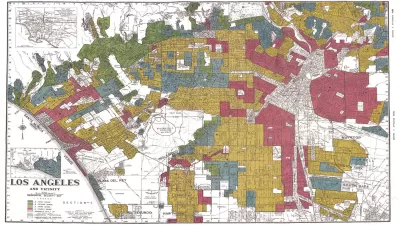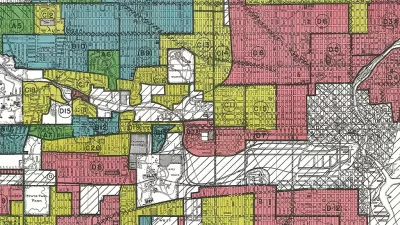Chicago's own city government, in the form of aldermanic prerogatives and privileges, contributes to racial and economic segregation, according to a new study.

Lolly Bowean reports: "As far back as the 1930s, Chicago aldermen used their ability to decide zoning and land use in their wards to create and maintain communities segregated by race and class, according to a new report."
"Some 80 years later, elected officials continue to lean on both their informal and documented powers to block affordable housing in affluent white communities and keep lower-income black and Latino residents confined to certain parts of the city, the report says," adds Bowean.
The report, titled "A City Fragmented," will be released this week by the Chicago Area Fair Housing Alliance.
Bowean digs deeper into the implications of the report, including the possibility that local elected officials violate civil rights laws when using their privilege to block affordable housing. More information about the nature of aldermanic privilege in Chicago is also available in the article. As hinted at above, much of this power is informal and unwritten. Here's how Bowean describes the approvals process that has created the problem:
Typically, if a development in a ward needs a zoning change or permit, and the development is not supported by the alderman of that ward, the proposal is voted down if it ever reaches the full City Council. In some cases, a developer can make a proposal, and the presiding alderman or zoning advisory council will dictate changes — such as how many of the apartments will be condominiums and how many should be set aside for lower-income residents. Those negotiations have to be navigated before the proposal can reach the City Council. The development proposal can also linger in the zoning committee, which is another way it eventually dies from inaction.
That probably sounds familiar to developers and planners living in other cities besides Chicago, and it's possible that the findings of this study could be reproduced or supplemented in other cities.
FULL STORY: New study examines aldermanic prerogative and how it can damage efforts to create affordable housing

Alabama: Trump Terminates Settlements for Black Communities Harmed By Raw Sewage
Trump deemed the landmark civil rights agreement “illegal DEI and environmental justice policy.”

Study: Maui’s Plan to Convert Vacation Rentals to Long-Term Housing Could Cause Nearly $1 Billion Economic Loss
The plan would reduce visitor accommodation by 25% resulting in 1,900 jobs lost.

Why Should We Subsidize Public Transportation?
Many public transit agencies face financial stress due to rising costs, declining fare revenue, and declining subsidies. Transit advocates must provide a strong business case for increasing public transit funding.

Wind Energy on the Rise Despite Federal Policy Reversal
The Trump administration is revoking federal support for renewable energy, but demand for new projects continues unabated.

Passengers Flock to Caltrain After Electrification
The new electric trains are running faster and more reliably, leading to strong ridership growth on the Bay Area rail system.

Texas Churches Rally Behind ‘Yes in God’s Back Yard’ Legislation
Religious leaders want the state to reduce zoning regulations to streamline leasing church-owned land to housing developers.
Urban Design for Planners 1: Software Tools
This six-course series explores essential urban design concepts using open source software and equips planners with the tools they need to participate fully in the urban design process.
Planning for Universal Design
Learn the tools for implementing Universal Design in planning regulations.
Caltrans
Smith Gee Studio
Institute for Housing and Urban Development Studies (IHS)
City of Grandview
Harvard GSD Executive Education
Toledo-Lucas County Plan Commissions
Salt Lake City
NYU Wagner Graduate School of Public Service





























